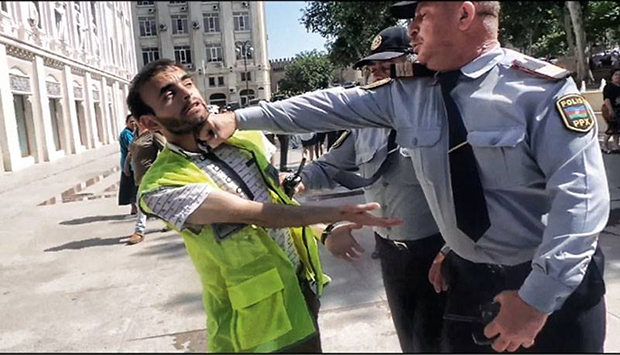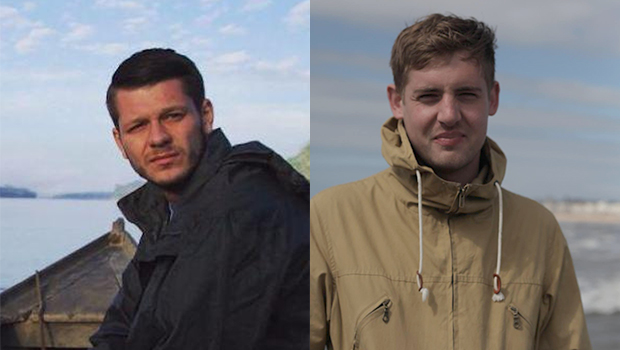1 Sep 2015 | Azerbaijan, Azerbaijan Statements, Campaigns, mobile, Statements
The Sport for Rights coalition strongly condemns the sentencing of Azerbaijani journalist Khadija Ismayilova to a staggering 7.5 years in jail. On 1 September, the Baku Court of Grave Crimes convicted Ismayilova on charges of embezzlement, illegal entrepreneurship, tax evasion, and abuse of office. Ismayilova was acquitted of the charge of inciting someone to attempt suicide. Sport for Rights considers the charges against Ismayilova to be politically motivated and connected to her work as an investigative journalist, particularly her exposure of corruption among the ruling Azerbaijani elite.
“We condemn today’s verdict in the case of Khadija Ismayilova, which puts an outrageous yet expected ending to the grotesque proceedings against her”, CPJ Europe and Central Asia Program Coordinator Nina Ognianova said. “The time for business as usual with Azerbaijan is over. We call on Baku’s counterparts in the international community to make no further dealings with this highly repressive state until Ismayilova is unconditionally released and fully acquitted of all fabricated accusations”.
“Khadija Ismayilova’s trial failed to meet minimum fair trial guarantees, a pattern that has been regularly observed by IPHR’s monitors in similar cases in Azerbaijan”, said Brigitte Dufour, IPHR Director. “The defence’s motions are routinely rejected, which runs contrary to the principle of equality of arms – a cornerstone of the right to a fair trial – and indicates that the judges in these trials are openly siding with the prosecution”.
One of Azerbaijan’s most prominent investigative journalists, Ismayilova is also among the most courageous, one of very few willing to report on risky topics such as human rights violations and corruption. In the months leading to her arrest in December 2014, Ismayilova was aware she could be targeted, which she linked to her investigations into the business interests of President Ilham Aliyev’s family. Despite being warned not to return to the country from trips abroad – during which she spoke at international organisations on abuses taking place in Azerbaijan – Ismayilova persisted, speaking out critically until her arrest, and even afterwards, in letters smuggled out from jail.
Sport for Rights believes that in jailing Ismayilova, the Azerbaijani authorities sought to silence her critical voice before the country faced increased international media attention during the inaugural European Games, which took place in Baku in June 2015. Sport for Rights has referred to Ismayilova as a “Prisoner of the European Games” – along with human rights defenders Leyla and Arif Yunus, Rasul Jafarov, and Intigam Aliyev, who were also arrested in the run-up to the games.
“For her thorough and fearless investigative journalism, which has uncovered corruption at the highest levels of power, Khadija has earned numerous accolades, including PEN American’s 2015 Barbara Goldsmith/Freedom to Write Award”, said Karin Deutsch Karlekar, director of Free Expression programmes at PEN American Center. “However, speaking the truth has grave consequences in Azerbaijan, where independent reporting has been all but extinguished through farcical trials, imprisonment, murder, and other forms of severe harassment. We demand that the government cease this unprecedented witch-hunt against journalists and their family members, and enable Azerbaijani citizens to freely access a range of news and information”.
The harsh sentencing of Ismayilova is the latest incident in an unprecedented crackdown being carried out by the Azerbaijani authorities to silence all forms of criticism and dissent. Less than two weeks before Ismayilova’s verdict, the same court sentenced human rights defenders Leyla and Arif Yunus to 8.5 and seven years in jail, respectively. Authorities have so far disregarded the widespread calls for humanitarian release of the couple, who both suffer serious health problems that continue to worsen in custody. Human rights defenders Intigam Aliyev, Rasul Jafarov, and Anar Mammadli are also serving staggering sentences of 7.5 years, six years and three months (recently reduced from 6.5 years by the appellate court), and 5.5 years, respectively, all on politically motivated charges.
The situation for journalists is also dire. On 9 August, journalist and chairman of the Institute for Reporters’ Freedom and Safety Rasim Aliyev died in hospital after being severely beaten the previous day. Aliyev had reported receiving threats in the weeks leading to the attack, and the police failed to provide him with protection. This attack followed an earlier high-level threat against an Azerbaijani journalist, Berlin-based Meydan TV Director Emin Milli, in connection with his critical reporting on the European Games. In addition to Ismayilova, journalists Nijat Aliyev, Araz Guliyev, Parviz Hashimli, Seymur Hezi, Hilal Mammadov, Rauf Mirkadirov, and Tofig Yagublu are also behind bars on politically motivated charges.
The Sport for Rights coalition reiterates its call for Ismayilova’s immediate and unconditional release, as well as the release of the other jailed journalists and human rights defenders in Azerbaijan. The coalition also calls for the Azerbaijani government to take immediate and concrete steps to improve the broader human rights situation in the country, particularly in the context of the upcoming November parliamentary elections. Without independent media coverage, including critical voices such as Ismayilova’s, the elections cannot be considered free and fair. Finally, Sport for Rights calls for greater vigilance by the international community to developments in the country, and increased efforts to hold the Azerbaijani government accountable to its international human rights obligations.
Supporting organisations:
ARTICLE 19
Civil Rights Defenders
Committee to Protect Journalists
Freedom Now
Front Line Defenders
Helsinki Foundation for Human Rights
Human Rights House Foundation (HRHF)
Index on Censorship
International Federation for Human Rights (FIDH), within the framework of the Observatory for
the Protection of Human Rights Defenders
International Media Support (IMS)
International Partnership for Human Rights (IPHR)
NESEHNUTI
Norwegian Helsinki Committee
PEN American Center
People in Need
Platform
Polish Green Network
Solidarity with Belarus Information Office
World Organisation Against Torture (OMCT), within the framework of the Observatory for the Protection of Human Rights Defenders
31 Aug 2015 | Campaigns, Mapping Media Freedom, Statements, Turkey, Turkey Statements
Index on Censorship calls on Turkey to release two Vice journalists and a local colleague who have been formally charged with “working on behalf of a terrorist organisation”.
“Coming just days after the unjust sentencing of three Al Jazeera journalists in Egypt, these latest detentions of journalists simply for doing their jobs underlines the way in which governments everywhere can use terror legislation to prevent the media from operating,” said Index on Censorship chief executive Jodie Ginsberg.
The British journalists, Jake Hanrahan and Philip Pendlebury, were detained on Thursday with a colleague working as a fixer, Iraqi translator and journalist Mohammed Ismael Rasool, and their driver by anti-terrorism police while reporting from southeastern Turkey. On Monday, the three were formally charged and arrested. Their driver was released.
“Turkey is already one of the worst places in the world in terms of freedom of the media. We call on Turkey to release these Vice journalists and to ensure that all journalists reporting in the country can operate freely.”
Turkey has one of the world’s worse records on media freedom. Index on Censorship’s project, Mapping Media Freedom, has recorded 146 verified reports since May 2014.
27 Aug 2015 | Europe and Central Asia, mobile, News

Female journalists and bloggers are increasingly being singled out and fiercely attacked online. (Photo: OSCE)
In a new online column for Index on Censorship, Dunja Mijatović, OSCE Representative on Freedom of the Media, discusses relentless attacks on women journalists, and the impact on their lives.
No job comes without sacrifices, but how many downgrading comments, criticism or even threats can one person take before it becomes too much?
Just consider the experiences of a female journalist that I know:
She had her phone number shared on dating websites, her email and other accounts were hacked, she received death threats on Skype, the website publishing her articles was hacked and a sex video was posted with the implication that she had participated in an orgy. Anonymous articles with lies about her and her family were also posted online.
Imagine being forced to shut down your accounts on social media platforms because of such massive attacks with detailed images of rape and other forms of sexual violence.
At one point, you would probably be inclined to ask yourself if it is really worth it. Is this a career I want to continue to pursue?
In the past few years, more and more female journalists and bloggers have been forced to question their profession. Male journalists are also subject to hate speech and online abuse, but research findings suggest that female journalists face a disproportionate amount of gender-based threats and harassment on the internet. They are experiencing what Irina Bokova, director-general of UNESCO, has described as a “double attack”: they are being targeted for being both a journalist and a woman.
How do these attacks affect female journalists’ lives, their work and society in general? Journalists are used to being in the frontline of conflict and they often deal with difficult and even dangerous situations. But what if you cannot shield yourself from these threats? What if the frontline became your own doorstep, your office or your computer screen?
Not only do these kinds of attacks cause severe physiological trauma for journalists and their families, but by constantly being singled out and targeted with abusive comments, many female journalists may re-evaluate the issues they choose to cover. In this way, such attacks pose a clear and present threat to free media and the society as a whole.
Online abuse must be dealt with within the existing human rights framework, with governments committed to protecting journalists’ safety and addressing gender discrimination. Governments must ensure that law enforcement agencies understand the severity of this issue and are equipped with the necessary training and tools to more efficiently investigate and prosecute online threats and abuse.
We have to acknowledge that online threats are as real and unacceptable as threats posed in the offline world. The landmark resolution 20/8 on internet freedom adopted by United Nations Human Rights Council in 2012, affirmed that “the same rights that people have offline must also be protected online, in particular freedom of expression”, and set out a clear path in this respect.
The responsibility to counter online abuse of female journalists does not solely rest with law enforcement agencies, however. The broader media community itself also plays an important role. One of the challenges facing media outlets is how to improve quality of content moderation without invoking censorship.
Sarah Jeong, lawyer, journalist and author of The Internet of Garbage, provides proper context, “moderation paradoxically increases the number of voices heard, because some kinds of speech chills other speech. The need for moderation is sometimes oppositional to free speech, but sometimes moderation aids and delivers more free speech”.
Media outlets need to address the current structures and strategies in place that provide support and relief to journalists who face online abuse. A recent survey of female journalists in the OSCE region carried out by my office suggests that employers’ awareness and active involvement in dealing with these issues is of crucial importance. Unfortunately, the survey also indicated that media outlets are not as involved as they should be.
International organisations should also dedicate resources to tackle this issue, given their widespread reach and vast partnership networks. UNESCO’s work on gender-related aspects of journalists’ safety serves as a good example. In their recent report Building Digital Safety for Journalists, online abuse of female journalists was rightly pointed out as one of the main challenges in building digital safety.
This year I have tried to use my mandate and tools given to me as the OSCE Representative on Freedom of the Media to get the OSCE participating states involved. We need to realize that different stakeholders face different challenges, but that each stakeholder’s involvement is a crucial piece of the puzzle in identifying solutions.
To further the discussion on protection of female journalists in the OSCE region, on 17 September my office will host a conference, New Challenges to Freedom of Expression: Countering Online Abuse of Female Journalists, to provide a platform for discussions on best practices and recommendations on combating this dangerous trend. The event will be streamed live on osce.org and will feature presentations by high-level experts from all over the world.
This column was posted on 27 August 2015 at indexoncensorship.org
10 Aug 2015 | Azerbaijan, Azerbaijan News, Campaigns, mobile

Photo: IRFS
The Sport for Rights coalition resolutely condemns the brutal murder of Azerbaijani journalist Rasim Aliyev, who died on 9 August in a Baku hospital, after he was severely beaten on 8 August by a group of people. Rasim Aliyev had reported receiving continuous threats and intimidation via social media networks for three weeks leading up to his death.
Azerbaijani authorities have launched an investigation into the attack and detained at least one individual so far. Officials are connecting the attack to a Facebook post from 3 August in which Rasim Aliyev had criticised a football player. The relatives of the football players are alleged to have been responsible for the beating.
However, prior to the Facebook post in question, Rasim Aliyev had already been receiving threatening messages connected to a series of photos he had posted online showing police brutality and social discontent, such as protesters carrying a banner reading “Resign”. Rasim Aliyev reported receiving a threat stating “You will be punished for these photos”. He publicised the threat on 25 July, and filed a complaint with the police, who failed to take action to protect Rasim Aliyev.
Rasim Aliyev was a board member and employee of Azerbaijan’s leading media freedom organisation, the Institute for Reporters’ Freedom and Safety (IRFS), and was elected as the organisation’s chairman in October 2014. Rasim Aliyev had faced many forms of pressure in his work with IRFS, including being beaten by police in a 2013 incident that was captured in a widely circulated photograph.
Notably, the attack against Rasim Aliyev took place exactly one year from the date IRFS was forcibly closed by the Azerbaijani authorities and IRFS founder and chairman Emin Huseynov was forced into hiding to ensure his own safety, on 8 August 2014.
“We are deeply shocked and saddened by the murder of Rasim Aliyev”, said Index on Censorship’s senior advocacy officer Melody Patry. “The attack on Rasim takes place in a deteriorating environment for media professionals and civil society in Azerbaijan. Rasim was an independent journalist who kept working after his employer, IRFS, was sealed shut by the authorities. IRFS existed to provide support to journalists like Rasim, especially at a time when threats, intimidation and violence against journalists are commonplace in the country. We call on the authorities to conduct a full and transparent investigation into the attack and bring the perpetrators to justice”.
Rasim Aliyev’s murder is the latest incident in a vicious cycle of violence against journalists in Azerbaijan. Over the past decade, there have been hundreds of attacks against journalists in the country, including the murder of Monitor magazine editor-in-chief Elmar Huseynov in 2005, and writer and journalist Rafig Tagi in 2011. Both murders remain unsolved, as do nearly all other cases of attacks against journalists. Another journalist, Tolishi Sedo newspaper editor-in-chief Novruzali Mammadov, died in 2009 while serving a 10-year prison sentence on politically motivated charges.
This attack takes place amidst a brutal human rights crackdown in the aftermath of the European Games and in the run-up to November’s parliamentary elections in Azerbaijan. In recent weeks, another Azerbaijani journalist, Berlin-based Meydan TV Director Emin Milli, reported receiving a high-level threat, which was shortly followed by pressure against many of his relatives. Four Meydan TV employees were later prevented from leaving Azerbaijan.
“Further evidence of the on-going efforts of the Azerbaijani authorities to silence all forms of criticism and dissent can be found in the many violations taking place in the cases of human rights defenders Leyla and Arif Yunus and journalist Khadija Ismayilova, who are currently standing trial on politically motivated charges”, said FIDH Honorary President Souhayr Belhassen and OMCT Secretary General Gerald Staberock, whose organisations work together within the framework of the Observatory for the Protection of Human Rights Defenders. The prosecutor has requested staggeringly long prison sentences for the Yunus couple, despite the fact that both have serious and worsening health problems and should be immediately released on humanitarian, if not political grounds.
Sport for Rights calls on the Azerbaijani authorities to conduct a full and transparent investigation into Rasim Aliyev’s murder, and to bring the perpetrators as well as the masterminds behind the crime to justice. The cycle of violence against journalists in Azerbaijan must stop, and those responsible must be prosecuted. Threats against journalists must be taken seriously, and the threatened journalists and their families must be afforded adequate protection. The coalition also calls for the authorities to take concrete steps to improve the broader human rights situation in the country, including the immediate and unconditional release of all jailed journalists and human rights defenders.
Sport for Rights further calls for the international community to maintain its attention on Azerbaijan now that media attention has shifted away from the country following the European Games. As Rasim Aliyev’s murder shows, critical voices are at greater risk now than ever before. The international community must act now to hold Azerbaijan accountable for its human rights obligations and promote much-needed reforms in the country.
Supporting organisations:
Article 19
FIDH (International Federation for Human Rights), within the framework of the Observatory for the Protection of Human Rights Defenders
Front Line Defenders
Helsinki Foundation for Human Rights
Human Rights House Foundation
Index on Censorship
International Media Support
Netherlands Helsinki Committee
PEN American Center
Polish Green Network
World Organisation Against Torture (OMCT), within the framework of the Observatory for the Protection of Human Rights Defenders
[smartslider2 slider=”35″]



